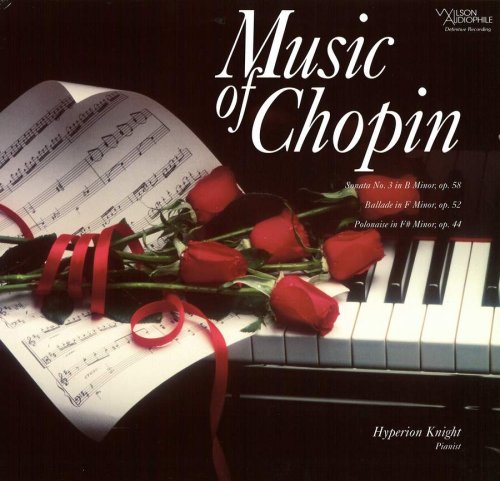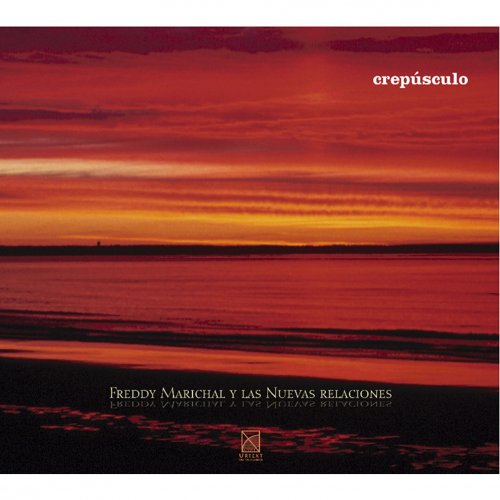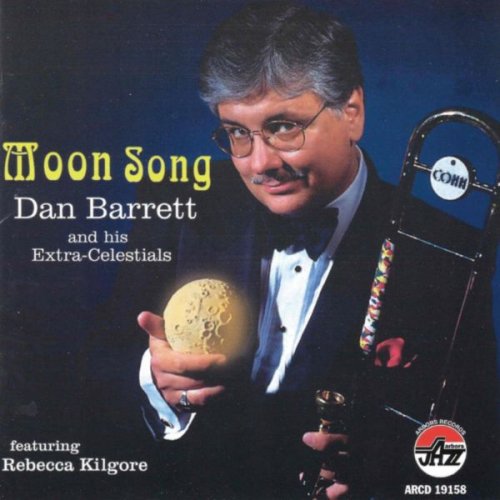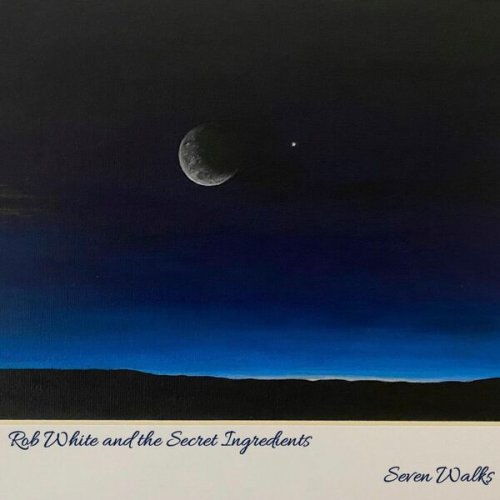Hyperion Knight - Music of Chopin (2014) [DSD64]

Artist: Hyperion Knight
Title: Music of Chopin
Year Of Release: 2014
Label: Wilson Audiophile Recordings
Genre: Classical
Quality: DSD64 2.0 (*.dsf) (tracks) 2,8 MHz/1 Bit
Total Time: 00:48:20
Total Size: 1.91 GB
WebSite: Album Preview
Tracklist:Title: Music of Chopin
Year Of Release: 2014
Label: Wilson Audiophile Recordings
Genre: Classical
Quality: DSD64 2.0 (*.dsf) (tracks) 2,8 MHz/1 Bit
Total Time: 00:48:20
Total Size: 1.91 GB
WebSite: Album Preview
Frédéric Chopin
Piano Sonata No. 3 in B Minor, Op. 58
1. I. Allegro maestoso
2. II. Scherzo: Molto vivace
3. III. Largo
4. IV. Finale: Presto, non tanto
5. Ballade No. 4 in F Minor, Op. 52
6. Polonaise No. 5 in F-Sharp Minor, Op. 44
“Oh God, where art Thou? Art Thou there and dost Thou not avenge Thyself? Art Thou not sated with murder? Or art Thou indeed a Muscovite?”
These words, written by Chopin after the fall of Warsaw to the Russians, seem as relevant to us in the latter part of the twentieth century as they did in 1831. Poland’s struggle for freedom and dignity strikes a common chord in all of humanity, and this perhaps best explains the continuing rise of Chopin’s popularity in an age which reviles romanticism. Friedrich Nietzsche spoke for many people of all nations when he was stirred to say: “I am too much of a Pole not to prefer Chopin’s music to all other music in the world.”
That Chopin’s music was the very essence of the Polish people seems evident in all of his works. The Warsaw press commented as early as 1830, when Chopin was but twenty years old, that: “Chopin knows what sounds are heard in our fields and woods; he has listened to the Polish village; he has made it his own.” Chopin himself wrote: “I should like only to write and leave for posterity the A B C of that which is truly Polish.”
What is somewhat less obvious in Chopin’s music is the dedication he felt to assist in the liberation of Poland. A few pieces, such as the “Revolutionary” Etude and the “Heroic” Polonaise, speaks directly and threateningly to the aggressors. His “Song from the Tomb” of Opus 74 was recognized as sufficiently incendiary to be banned by the Prussian censors, and again later by the Nazis. Most of his works, however, more aptly fit the description of Robert Schumann: “Chopin’s works are cannon buried in flowers…”
The Polonaise in F# Minor, Op. 44 was originally described by the composer as a “Fantasia in the form of a Polonaise”, but it certainly contains all of the fire and patriotism of the “Heroic” Polonaise in Ab. The “Fantasia” element stems from the mixture of forms in the piece – a deeply nostalgic “Mazurka” is inserted between the outer layers. The rest of the Polonaise is virtually a call to arms. Such proud music is Chopin at his most defiant, ending with what Franz Liszt called a “convulsive shudder at the close.”
These words, written by Chopin after the fall of Warsaw to the Russians, seem as relevant to us in the latter part of the twentieth century as they did in 1831. Poland’s struggle for freedom and dignity strikes a common chord in all of humanity, and this perhaps best explains the continuing rise of Chopin’s popularity in an age which reviles romanticism. Friedrich Nietzsche spoke for many people of all nations when he was stirred to say: “I am too much of a Pole not to prefer Chopin’s music to all other music in the world.”
That Chopin’s music was the very essence of the Polish people seems evident in all of his works. The Warsaw press commented as early as 1830, when Chopin was but twenty years old, that: “Chopin knows what sounds are heard in our fields and woods; he has listened to the Polish village; he has made it his own.” Chopin himself wrote: “I should like only to write and leave for posterity the A B C of that which is truly Polish.”
What is somewhat less obvious in Chopin’s music is the dedication he felt to assist in the liberation of Poland. A few pieces, such as the “Revolutionary” Etude and the “Heroic” Polonaise, speaks directly and threateningly to the aggressors. His “Song from the Tomb” of Opus 74 was recognized as sufficiently incendiary to be banned by the Prussian censors, and again later by the Nazis. Most of his works, however, more aptly fit the description of Robert Schumann: “Chopin’s works are cannon buried in flowers…”
The Polonaise in F# Minor, Op. 44 was originally described by the composer as a “Fantasia in the form of a Polonaise”, but it certainly contains all of the fire and patriotism of the “Heroic” Polonaise in Ab. The “Fantasia” element stems from the mixture of forms in the piece – a deeply nostalgic “Mazurka” is inserted between the outer layers. The rest of the Polonaise is virtually a call to arms. Such proud music is Chopin at his most defiant, ending with what Franz Liszt called a “convulsive shudder at the close.”






![Sam Fribush - People Please (2024) [Hi-Res] Sam Fribush - People Please (2024) [Hi-Res]](https://www.dibpic.com/uploads/posts/2026-01/1768311122_folder.jpg)

